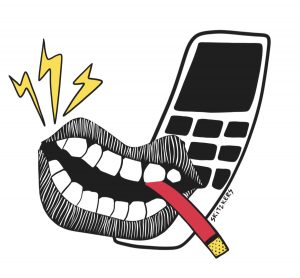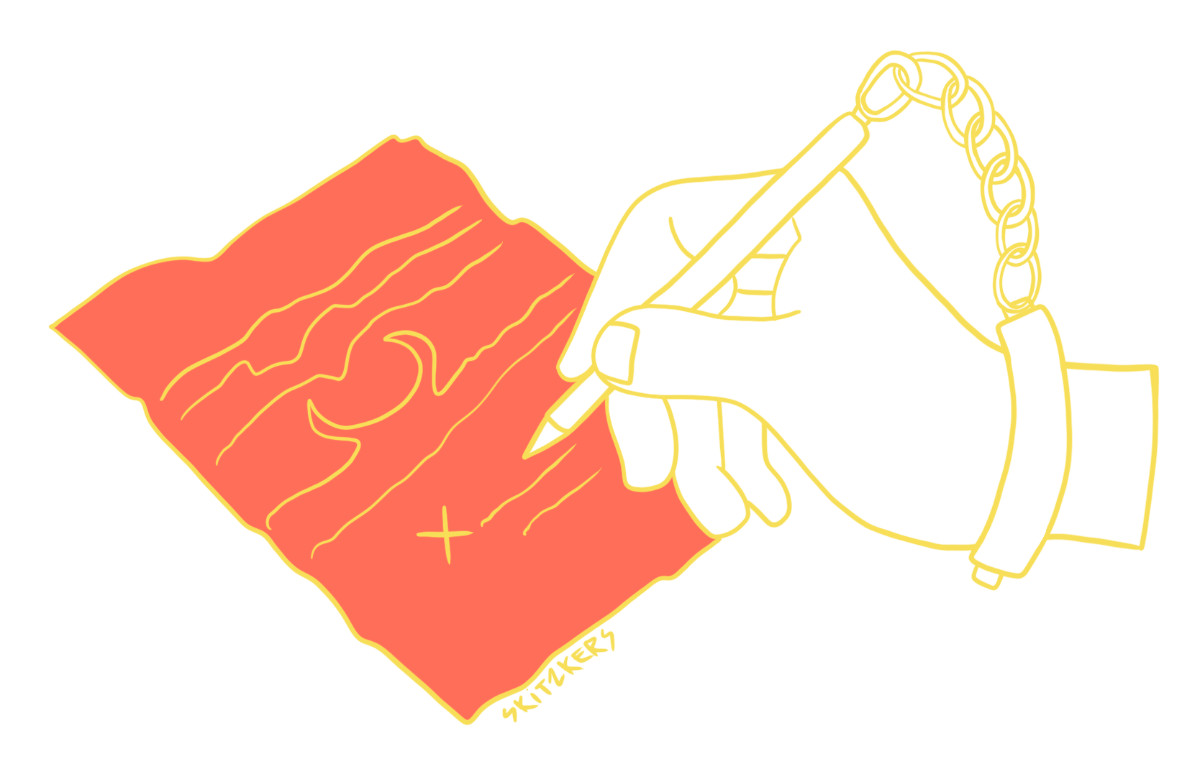Music can uplift a mood, bring back an old memory, prompt you to break out in dance or act as the catharsis for the anger you forgot you still held within you. I remember when I used to download an album on my iPod Nano, close my eyes, zone out, and focus on the flow of the music. I resonated with the angsty lyrics of female punk artists who normalized my expression of rage when the message from the rest of the mainstream media preached submissive softness. From then on, I began to look for local shows to attend and I came across the quirky indie scene in Vancouver. I constantly questioned the all-white, cis, straight male line-ups featured on stage, why they would encourage women to the front of the audience but then neglect to represent us as the headliners or the side act. Let alone other marginalized communities.
The mainstream industry fails to reflect the woman listener. Since the patriarchal power structures act as barriers to access, in daily life, women wearing band shirts encounter confrontations from superfans doubting their allegiance to the band. Or adverse scoffs from men who doubt their capacity to withstand the intensity of a mosh pit. And even the occasional inappropriate sexual remark or harassment. Due to advancements in technology, artists can now produce and record music on their own and self-release on platforms such as Spotify and Bandcamp. However, these progressions neglect to rewire the misogynistic attitudes towards women as maintained by mass media. But these difficulties have not stopped women’s passion for the music scene. Instead, they learn that resilience is imperative for success in this industry. Thick skin is more valuable than a big ego, especially when gaslighted. Women must hone into their gut instinct when navigating this industry; when they encounter experts who undermine their abilities – after all, she is a woman. The patriarchal control of the industry makes it in dire need of an intersectional feminist revolution. But that does not stop women from browsing at record stores, singing into a microphone, or picking up an instrument.

At an open mic night in Manchester, Ella was one of the artists performing alongside her friend and fellow musician, JodyJody. While another musician performed, a group of three rambunctious men in the back hollered through her entire act. Not long ago, Ella self-released Facetious Emo Niece on Spotify. She got up on stage with just her drum patch kit and laptop. To grab the attention of the room Ella scanned the room, looking out at the bartender in the back of the venue. Her charming stage presence caught the eyes of the men. She began to perform catchy beats with an indie flare. When the set finished, one of the men approached her saying his friend wanted to talk to her. The friend, a mid-40s and balding man, then proceeded to offer her the opportunity of a lifetime for an aspiring musician; he guaranteed connections resulting in a record deal in Los Angeles. When Ella handed over her business card, he kept insisting: “you do not believe me.” As if to gaslight her. She describes to me that she “felt all kinds of things that night. Wow, is this for real? Is this the thing people talk about? Am I on this trajectory where he is going to call someone and send them my mixtape? I was optimistic, but also as a cynic. I doubted if it would happen.” When Ella arrived back at her flat, she sat on her bed, waiting for a phone call from a visiting friend for when she arrived at the train stop. To her surprise, when her phone rang, it was not her friend but the man from earlier. He was drunk and begging her to come out and join him for a round of shots. At that moment, the facade of stardom was replaced with the reality of false promises. Ella jokes that “spoiler alert, you know me now, so I did not get on a plane in two weeks or else I would be hanging out with Ariana Grande right now.”
For Madeline record collecting is more than a passion, it is a way of life. When she moved to the city all she took with her was a suitcase and her collection of records — the necessities. Despite coming of age in the scene back in her hometown where she felt welcomed when I asked Madeline if she felt like her gender had been a factor in her mistreatment working in the record store industry she responded saying: “Yes, the five men who were higher-ups had little to no respect for my ideas or knowledge. From conversations with them, I would usually get reactions, such as “girls like you listen to Rod Stewart?!” Madeline previously worked at two different Mom-and-pop record stores in Kelowna before her relocation to Vancouver, where she settled into a job at Sunrise Records in Tsawwassen. Even though she would have preferred to stay away from more corporate establishments, they paid a good salary. Despite that, she still struggled to pay her bills. While working a management position at Sunrise, Madeline missed the customers who would share stories about seeing Led Zeppelin during their prime. Instead, she was attending to mall rats who lacked the musical knowledge of her past clientele, who instead would remark with “they still make these things?” Working at Sunrise, the final blow was when a guy of the same age got hired, with previous experience at only one other record store. She was checking her work email when she noticed Sunrise was paying him more than her. “That pissed me off more than anything. I ended up confronting my district manager.” She brought up that she mentioned her wage at her previous job during the hiring process and in response to her reminder, the manager replied with “well, I do not know what to tell you.” She felt as if she could not persist because she needed the reference when looking for alternative work but thankfully was already in the process of starting her new job at Urban Safari, a local shop in Cloverdale. It has a wonderful selection of vintage and new records and makes every patron feel welcomed. Madeline suggests that if you are into collecting records: “Don’t buy a Crossley. They fucking suck.”

Nakuset is a skilled artist and musician. “I have wanted to be a force in my world ever since I was a kid.” Enthralled by the boundlessness of experimentation and innovation of metal music, she began performing in 2014. Eventually settling into The Vth Circle, where she rocks-out on a badass 6-string bass. She co-founded her own promotional company, Solar Flare Entertainment, which books shows. “It’s empowering to be surrounded by like-minded people. My perspective as a femme in the music industry is one among many that are striving for equality.” As an organizer, she aims to ensure an environment that eradicates sexism, homophobia, racism and transphobia. As a booking agent, she emphasizes female musicians in the lineup. However, misogyny is rampant in the male-dominated metal scene and is evident in the way people change how they speak to her once they uncover she is the organizer. In earlier years of her career, previous band members questioned her capability by condescendingly offering suggestions. Not to mention that “on multiple occasions when I replaced a male bassist or beat out a male bassist trying out for a band, I received harassment from them.” She has also come across band members that urged her to capitalize on her femininity to sell records, which made her want to do the opposite. Although she has no problem with her looks catching the eye of other musicians or booking agents, “if they think that is a reason to try to under-pay or disrespect me, that is where I set a boundary.” In the Vth Circle, the band members wear whatever they want. The male musicians have even performed in sexy womenswear. “We had a lot of fun with it and it got people talking about the role reversal we demonstrated with the guys wearing less on stage than the female band members.” As part of Solar Flare Entertainment, Nakuset has formed an allied community that has no tolerance for abhorrent behaviour. “Being a woman in metal combats the outdated idea that women are weak, subservient and able to be silenced. If anything we have the most to say!”
Innovations in music production have opened up the door for anyone with a laptop, diaphragm and a guitar to enter this industry. However, barriers to access remain; especially for those who are not straight, cis, white males. Even in our local scene, the majority of labels, festivals, and music magazines are predominantly owned and operated by men. There is still a lot to be done in terms of progress. These three resilient women are part of the revolution. By sharing their stories with me I hope to start a conversation about the change we need, now. They are making a better world for the musicians and the record collectors that are to come. In the future, I aspire to exist within a music scene that represents all genders and marginalizations. In order to dismantle the patriarchy, we start by having difficult conversations. Nakuset suggests patrons to “use your critical thinking and normalize respecting women as equals in your social group.” So next time you are at a show and you see someone acting like a bigoted asshole, call them out and hold them accountable.


